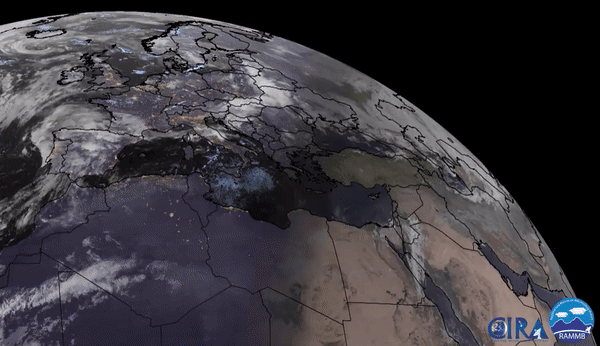See the moon's shadow crawl eerily across Earth in last solar eclipse of 2022 (satellite video)
The ghostly sight happened just a few days before Halloween.

The shadow of Earth's closet companion looms large in new footage.
The moon cast its shadow upon the Earth in footage captured by satellites run by Eumetsat (European Organisation for the Exploitation of Meteorological Satellites) during a partial solar eclipse today (Oct. 25).
At least three views of the haunting imagery were available from the satellites of Meteosat, which operate in geostationary orbit and are tasked with providing weather data to assist with forecasting and long-term predictions of climate change.
"Look near the top of the video, especially on the right hand side: Can you see the moving dark area? That's the shadow," tweeted Simon Proud, a senior scientist at the U.K.'s National Centre for Earth Observation and at RAL Space (a part of the Rutherford Appleton Laboratory.)
Related: The last solar eclipse of 2022 thrills skywatchers around the world
The shadow of the Moon passing over the Earth during today's #Eclipse, as seen by @eumetsat's #Meteosat.Look near the top of the video, especially on the right hand side: Can you see the moving dark area? That's the shadow! pic.twitter.com/iqesMAdtXLOctober 25, 2022
Later in the day, Proud provided more footage from Meteosat-9, one of the three operational satellites (along with Meteosats-10 and -11.)
"You can see the shadow of the moon moving from left to right, eventually merging with the darkness of sunset," he wrote.
Breaking space news, the latest updates on rocket launches, skywatching events and more!
Another view of today's Eclipse. This time from @eumetsat's #Meteosat-9 spacecraft that covers the Indian Ocean region.You can see the shadow of the moon moving from left to right, eventually merging with the darkness of sunset. https://t.co/5IwnXHBcZV pic.twitter.com/yV5dERACy4October 25, 2022
The U.S. National Oceanic and Atmospheric Administration (NOAA) shared more footage from the satellite, noting that Meteosat-11 is a partner satellite to the agency's own fleet of meteorological watchers.
"In this #GeoColor imagery, you can see the moon's shadow travel over the North Atlantic and Europe, before ending over Asia," NOAA added.
The last partial #SolarEclipse of 2022 was caught by our European partner's satellite, #Meteosat11, this morning! In this #GeoColor imagery, you can see the moon's shadow travel over the North Atlantic and Europe, before ending over Asia at 9:01 am EDT. pic.twitter.com/1abVXEYBH0October 25, 2022
While this was the final solar eclipse of 2022, there's still more eclipse action in store this year. You can catch the final lunar eclipse of the year on Nov. 8, 2022, with details on how and where to see it located in our lunar eclipse 2022 guide.
If you want more advice on solar eclipse photography to help you prepare for the next solar eclipse, our guides on how to photograph a solar eclipse and the best cameras for astrophotography can help you find the camera gear you need to capture your next best image.
Editor's note: If you have captured a good partial solar eclipse photograph or video and would like to share it with Space.com's readers, send your photo(s), comments, and your name and location to spacephotos@space.com.
Follow Elizabeth Howell on Twitter @howellspace. Follow us on Twitter @Spacedotcom or Facebook.

Elizabeth Howell (she/her), Ph.D., was a staff writer in the spaceflight channel between 2022 and 2024 specializing in Canadian space news. She was contributing writer for Space.com for 10 years from 2012 to 2024. Elizabeth's reporting includes multiple exclusives with the White House, leading world coverage about a lost-and-found space tomato on the International Space Station, witnessing five human spaceflight launches on two continents, flying parabolic, working inside a spacesuit, and participating in a simulated Mars mission. Her latest book, "Why Am I Taller?" (ECW Press, 2022) is co-written with astronaut Dave Williams.
